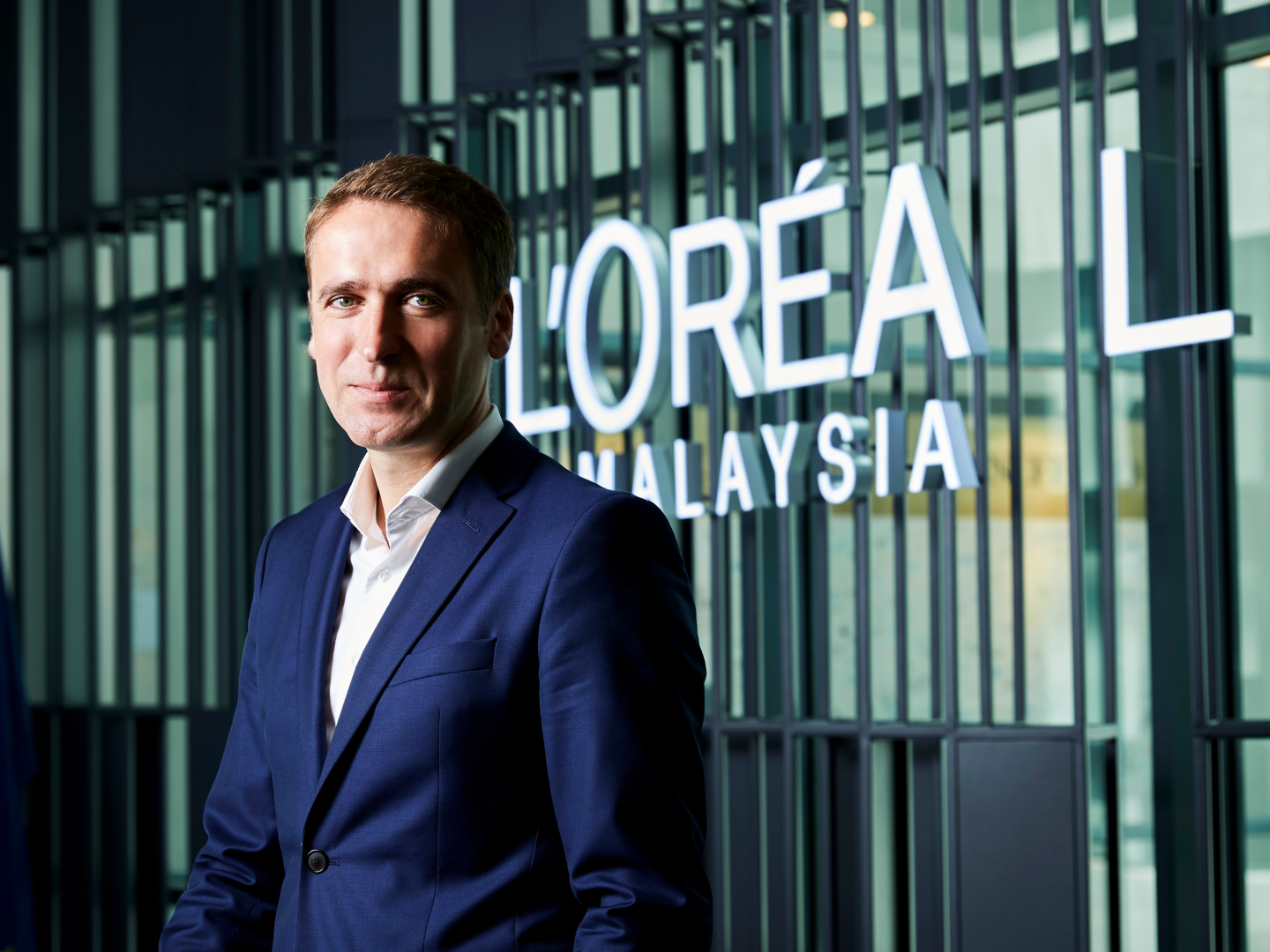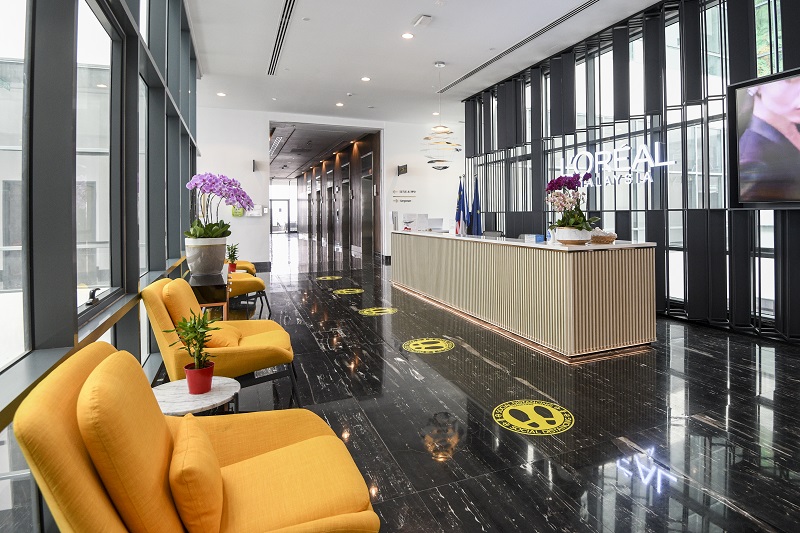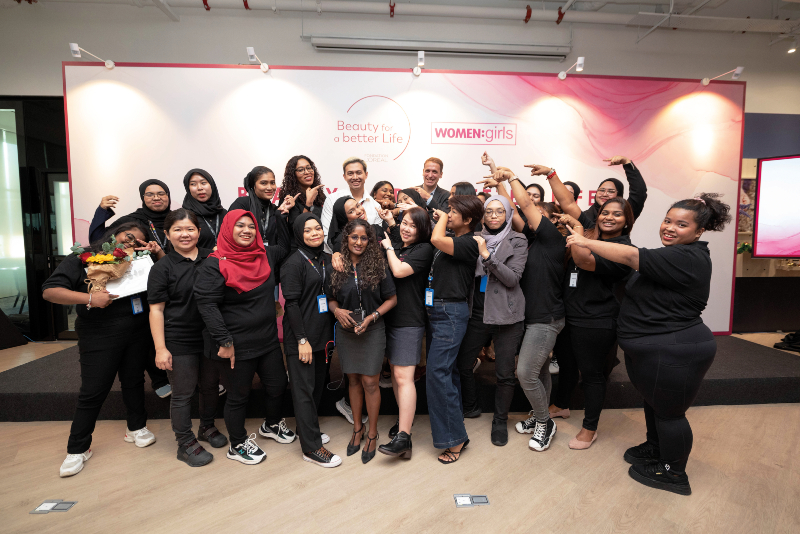
Hruska says curiosity led him into cosmetics and beauty (Photo: SooPhye)
A fortnight was all it took for Tomas Hruska to be smitten by the beauty industry: It felt good to be working on something that made people happy. He joined L’Oréal in 1999 and has not looked anywhere else since.
The managing director for L’Oréal Malaysia and Singapore says curiosity led him into cosmetics and beauty when he was looking for a French company to work with, having studied in France. Another factor that has kept him in the business for more than two decades is how fast things move.
“We create dreams, aspirations and excitement for consumers. The speed of innovation and change, of bringing in new products and technology is fascinating. And how we have embraced beauty tech. Who would have thought you would be buying lipsticks online, using digital devices to do a skin diagnosis and virtual trials for make-up and hair colour, or choose your products? This industry is one of the fastest moving. After two weeks, I decided it would be my lifetime company,” says Hruska, who hails from the Czech Republic.
That it is no longer just a French company is icing on the cake. “It has let me explore jobs in so many parts of the world. I always say I didn’t move elsewhere because if you like what you’re doing, there is no reason to be looking left and right,” says Hruska, 47, who assumed his current role last July when L’Oréal combined operations for Malaysia-Singapore to form a bigger organisation. This is his first Asian posting after the Czech Republic, the group’s HQ in Paris, Sweden, Italy and Denmark.
Malaysia is a sort of fresh start for him. At L’Oréal’s office in Powerhouse, Petaling Jaya, he talks about the burst of energy he gets from discovering new markets, cultures and consumer behaviours. Merging forces with Singapore means more power to grow, especially in scale, as well as increased career opportunities for all 400 employees from both sides.
In the last seven years, Hruska was involved in cluster organisations in Central and Northern Europe, from the Czech Republic, Hungary and Slovakia to the Nordic countries of Denmark, Sweden and Finland. The group is taking lessons from these experiences and putting them in place, he says.
“It’s a fantastic adventure from the business aspect because [the operations] allow us to invest in new capabilities for the future, such as digital data, beauty tech and transformation projects. Mixing the countries and people with different cultures and opinions — in-house, we have 13 nationalities here — creates a diverse team that performs more. Operating in two countries also enables us to offer employees a more interesting career path — they can move between both and elsewhere.”
20220729_bld_loreal_office_sb_26.jpg

He believes diversity is good for creativity and generating ideas. Drawing on what he gleaned in Europe, he wants to “mix the people and create an inclusive environment based on respect and diversity, with an objective to grow. We want to make this a great place to work and build careers”.
Coming in with a backpack filled with knowledge of the company and its values, along with his experience, he wants to continue with that and form stronger bridges. Another aim is to bring employees to the HQ in France. “We have transferred six Malaysians to other countries where L’Oréal has a presence.”
Growing the local and regional markets
Hruska sees growth potential in the country and plans to bring in more brands and products. L’Oréal Malaysia is 28 this year — young compared to the parent company, founded in 1909 by a chemist who formulated and manufactured a hair dye and sold it to Parisian hairdressers.
“We see an appetite for beauty here. We’re excited by the trends, the innovation. There are exciting growth opportunities, especially with Generation M, Muslim consumers, across all ages. They are a very important part of our consumer target. We want to understand them better and offer them relevant and better products and beauty routines,” he says.
Newcomer advantage helps Hruska spot trends and whittle down what to build on. Driving to Melaka one recent weekend, he noticed the many advertisements along the highway targeted at the Muslim market.
He sees commonalities in consumer behaviour and how people view beauty essentials, the way they shop, and the role and positioning of products on the racks. The structure of distributing partners — the stores — is similar. So, too, the aspirations of opinion leaders — the influencers. All this helps him strategise not just for one country, but the whole region. The different ethnicities and cultures form a diverse consumer landscape that translates into opportunities to meet specific needs.
“We have a sense of purpose at L’Oréal — to create beauty that moves the world. In the last 113 years, we have only specialised in beauty products, through research and innovation. We’re helping people express themselves, to feel better and have confidence. It’s not only about providing a mascara or cream, but also helping them be a better version of themselves.”
Post-pandemic, he understands how beauty plays an essential role in people’s lives, as more consumers are picking up facial care products and fragrances.
“It’s a moment you have for yourself, taking care of yourself. Even the first draw of fragrance was during Covid, when it started to be a part of feeling good. I think this is what people are looking for today.” Giving them a hand on their journey is exciting, he says.
“You ask me, ‘What is the beauty aspiration?’ Every single consumer has her own. For Gen M, beauty plays a key role in socialising — it’s very community-driven. We have the advantage of 13 international brands and are looking to bring in more.” This aligns with its mission of providing beauty solutions for different ages and personalities, across all cultures and ethnicities, geographically.
Feeding the appetite for beauty
L’Oréal’s brands are organised under four complementary divisions: consumer products, sold in mass-market channels such as pharmacies and hypermarkets; luxe (more premium lines targeted at the affluent); active cosmetics (from skincare to haircare); and professional products (for use by salons).
The use of make-up is evidently starting younger, while different trends dominate hair colours, depending on age. Self-expression drives the young to experiment with shades, while more senior users choose traditional tones to highlight their crowning glory and personality.
The men’s segment has huge potential to grow, and Asians lead in sophistication compared with the rest of the world, Hruska says. Demand for facial skincare is on the upswing and guys can expect more lines in this category, as well as for hair colour.
To gauge what people want, the company introduced what it calls “customer connect”, whereby its marketers go to the ground and ask, “What is beauty for you?” The most common reply: “It is my face.”
A person’s face is the most important expression of personality in Asia, Hruska observes. Consumers often say they do not buy many products. “Then they start putting them on the table and you see 10 to 15 things, used almost on a daily basis.”
Face care is a priority for many, with the average person picking up various items — moisturisers, cleansers, sunscreen, lotions for breakouts — as skincare becomes more sophisticated. Make-up demand is going back to pre-pandemic levels. “It’s more about expression”, and most women would use a variety of things, with lipstick first, then foundation and mascara.
Haircare makes up a sizeable category of the business and hair colourants are popular. A new trend the team perceives as something big in the country is the demand for fragrances.
“It has been here, but we are looking at almost triple-digit growth, post-Covid. We are trying to decode it now, to understand whether there’s going to be something about feeling good, about doing it first for yourself — a moment to indulge — than as a part of your personality and expression. Or how others can perceive you [through] smell.
“What’s important to know is Covid did not change the appetite for beauty — it has always been there. There was just no physical access to it. Of course, there was a drop in consumption, but it was driven more by store closures than choice,” Hruska emphasises.
With people returning to stores and masks being removed, he is glad to see women taking out their lipsticks. “Make-up and fragrance are experiencing a boom because people are socialising again. Recovery is fast because it was never a problem of demand.”
Schooled in business and interested in marketing and building strategy, Hruska was drawn by L’Oréal’s approach in these areas from the beginning. He remembers his early days, when he had little knowledge of what was on the shelves.
“Once you get in, you learn to figure out the science in them, the different technologies behind the thousands of products, the reason they exist. It’s never-ending and you develop expertise over the years, you develop love. We are always close to the products. Whenever I go on vacation, my first stop is always the [cosmetics] shop, to look at and touch them.”
Beauty tech continues to fascinate him because there is magic in the very visual and engaging process of putting life-changing tools online so consumers can diagnose their skin concerns, take part in virtual trials or select a foundation to suit their skin tone. From a machine that lets them watch the effects of pigmentation or ageing on skin to mixing lipstick so it matches their hair colour, “the tools are coming to our market. As we speak, we’re launching a sunscreen and you can see how it protects skin when applied. We believe in combining the best of tech with the beauty experience to bring more brands and products to consumers”.
Making an impact inside and outside the company
On plans for the countries under his charge, Hruska wants to build a life company that people will feel good working in as they learn, develop, have interesting careers and enjoy work-life balance. “This is what I have seen at a lot of subsidiaries where employees are passionate and committed. I want this to be a great place for our people first.”
L’Oréal was placed fifth, for the second consecutive year, in Universum’s 2022 global ranking of business students’ favourite companies. “Ahead of us were all the tech organisations,” Hruska says, with a hint of pride. He wants to position the company as top-of-mind for graduates in Malaysia and Singapore, to hone skills and lift their careers to an international level.
Pushing the parameters further, he hopes to make L’Oréal a life company for the community as well, by playing a strong role in sustainability, among other efforts. For the sixth year running in 2021, it was awarded a triple A rating by CDP (a UK-based non-profit organisation formerly known as the Carbon Disclosure Project) for its actions in tackling climate change, protecting forests and ensuring water security.
Making a positive impact on the ecosystem that staff work in and interact with aligns with Hruska’s “personal wish” to make a change, alongside business partners and the authorities. “We feel we can really help, with our size and scale, even in Malaysia. We have been doing lots of programmes to educate students on how to reduce, reuse, recycle and change behaviours.”
In 1998, Fondation L’Oréal, together with Unesco, launched the For Women in Science programme to honour those who have contributed to scientific progress globally. This was introduced in Malaysia in 2016 and, since then, more than RM1 million in grants have been awarded to 57 women scientists in recognition and celebration of their work and contributions.
The foundation also oversees Beauty for a Better Life in 25 countries, to equip socially and economically vulnerable women with vocational skills such as hairdressing and make-up so they can gain access to employment. Last September, after two years of lockdowns, L’Oréal Malaysia trained about 30 participants under this programme over three months.
loreal_1dec2022-beauty_for_life_graduation.jpg

Happy staff equals better business
After a year in the country, Hruska is still discovering things every day, refreshed by “the shot of energy when I came here, the positive energy to go on”. What amazes him is people’s capacity to embrace speed and change.
“What we are able to do in Europe in one year, we do it in six or even three months here.”
He is also charged by the commitment and curiosity he sees around him. “I would say people are very committed, very engaged in the future and willing to learn.”
But there is a dark side to the speed and “can do lah” attitude that does escape him. Mindful of people giving too much to work at the expense of their personal life, the Malaysia-Singapore offices have come up with an employee manifesto to change the rules.
Employees want better work-life balance, which means no working late into the night and no emails or messages after certain hours and on weekends. Hybrid work, a result of the lockdowns, allows more flexibility, so there is now work-life integration: Staff can choose which two days of the week they want to work from home. The team is also looking at cutting down on meeting time, focusing on what matters when they do meet and dispensing with bureaucracy.
The whole idea is to let employees have time for themselves and family. People need to rest to be fully motivated for work, says Hruska, who sees himself as a “very people-oriented manager”.
“My conviction is, if you create a good place for employees, the business will come. It sounds like a cliché but, honestly, I mean it. I try to put the people first before we speak about something else. There is a clear correlation between the people in the work and results.
“I was lucky that in the different places I have worked, we enjoyed growth and good business results, but it was really on the back of people satisfaction in the work. We measured this. Every year, we have what we call a ‘pulse survey’. We take the pulse of the company from employees and measure our progress. When you put these lines next to your results, they are exactly the same.”
What would make him proudest to know is that “I have created a better place for work than when I started”. Knowing he played a part in helping someone move up makes him feel good too. “I’m receiving emails from people who say, ‘I’ve just landed in Paris.’
“Lots of people are moving and having international careers and a nice personal life and discovering new countries. This gives me satisfaction and affirms all the efforts we’re putting in. But I would say, we satisfy employees, then the consumers and bring them all the products. Bringing a smile to people’s faces keeps me motivated every morning.”
When he is not doing that, Hruska plays ice hockey and heads outdoors to bike and run.
“I liked the Nordic weather a lot. In my first month here, I almost melted. When I went running for the first time, I didn’t pick the right hour of day. But you get used to it. It will be tough to go back to something colder.”
Like every parent with growing children, he has had to get used to the “shock” of his 18-year-old son leaving home. The younger boy is 16 and has two years to go. “That’s it. Children grow up too fast. That’s also why I try to keep my personal balance and ask people to do the same.”
Hruska says he can now see why expatriates do not want to leave Malaysia, whose “nice people are open to others coming to the region”, and has a culture of hospitality and great food. He has tasted about 20% of the must-haves. What he likes to do is stop at street stalls and try something new, sometimes not even knowing what it is.
He is used to getting second looks when people learn how long he has been with L’Oréal. A millennial colleague tells him she needs to leave because, after three years, people would look at her “very strangely” if she does not.
“Today, people change jobs because they need to see other things. We accept and understand that. The great thing is, some of those who left us are coming back. I was lucky to have a career in different countries, with changing roles and experiences. I tell employees I want them to stay as long as I have.”
This article first appeared on Jan 23, 2023 in The Edge Malaysia.


